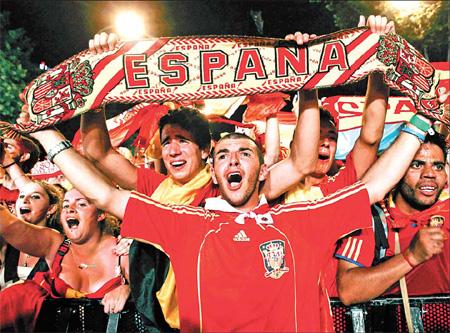
Spanish soccer fans celebrate in Madrid after their team won the 2010 World Cup final against the Netherlands on Sunday. [Agencies]
Businesses enjoy boom times during the world's largest sports gala
It may have rained all day but sunglasses were everywhere at the Spanish and Dutch pavilions at the Shanghai Expo on Monday.
After almost 24 hours of World Cup final preparations and celebrations - particularly for the Spanish, whose national team won the Netherlands' players 1-0 - weary workers donned the shades to try and hide their tired eyes from visitors to the Expo Garden.
"I only slept for two hours last night," said a worker standing outside the Spanish Pavilion. "That's why we've all got sunglasses on: To cover our bloodshot eyes."
Staff at both pavilions had already spent Sunday entertaining guests with gifts and games ahead of the much-anticipated showdown in South Africa. Jerseys and balloons in the colors of the Oranje and the La Furia Roja were handed out to all who passed by, while big-screen television sets showed rolling highlights of World Cup matches.
"We're not allowed to let tourists stay in the Expo Garden after closing time at midnight but there were still about 300 workers from different pavilions all gathered here to watch the match," said Yang Yue, a press officer for the Spanish Pavilion.
Yang said the pavilion hosted a cup final party from 10 pm on Sunday, where people could enjoy a selection of Dutch cheese and some traditional Spanish sangria punch.
Although the tournament has been a draining experience, in which matches past the quarterfinals kicked off at 2:30 am in China), the tournament has provided soccer fans with a month of nonstop excitement - and many businesses with a host of moneymaking opportunities.
In particular, bars and restaurants across China are now totting up their takings after doing roaring trade during the finals.
"Our revenue increased by 20 to 30 percent since the start of the World Cup," said Martin Berasategui, who owns a Spanish restaurant in Xujiahui, a busy shopping area in downtown Shanghai. "And it was even better that our national team won."
To capitalize on his country's success (Spain, the reigning European Champions, had never won the World Cup before), Berasategui said Restaurant Martin will be giving free Champagne to diners on Monday.
The competition was good for souvenir sellers, too, including the official World Cup store inside the Expo Garden.
"We released a limited pack of 32 pins of the teams playing at the finals for 888 yuan ($130) five days before the Spain versus Holland game," said Zhang Hui, the store's assistant manager. "We sold 120 sets in the first hour."
Winning the game
Large businesses have also enjoyed boom times, such as Yingli Green Energy Group, which reportedly paid $80 million to have its logo displayed on pitch-side hoardings for eight minutes at all 64 World Cup matches.
Chief executive Miao Liansheng did not need an octopus to predict his company would do well out of the sponsorship deal.
Although the company is yet to report a sales boom, its stock listed on the New York exchange has risen almost 38 percent since June 7, pushing its market value past $474 million. Its shipment volume is also expected to double this year compared to 2009, said spokesman Miao Qing.
The deal agreed between Yingli and FIFA (world soccer's governing body) means the brand will also have pride of place at the next World Cup finals in Brazil in 2014.
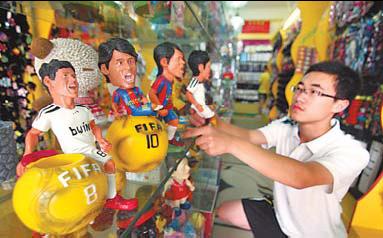
A shopper selects World Cup-related handicrafts at a store in Zhucheng, Shandong province, last month. [China Daily]
Harbin Beer, a popular Chinese brand owned by Anheuser-Busch InBev that was made available at venues across South Africa, also increased production levels by 5 to 10 percent to meet demand.
Manufacturing firms in China were perhaps the biggest winners, though.
Domestic firms made about 90 percent of vuvuzelas (colorful horns) on sale at the World Cup, a market worth roughly $20 million, while Zhejiang Dafeng Sports Equipment Co Ltd made the 50,000 seats fitted at the Nelson Mandela Bay Stadium in Port Elizabeth.
China also exported more than 100 million condoms to South Africa ahead of the World Cup, according to Tan Xiaolun, deputy director of the China Rubber Industry Association's emulsion branch.
"Experience shows that large sporting events always have a positive effect on condom sales," he told Mirror Evening News.
He explained that the majority was produced by rubber factories in Guilin in the Guangxi Zhuang autonomous region and Guangzhou, capital of Guangdong province.
China was chosen to make the condoms because it has a low labor cost and a large production capacity, added Tan. "There is not much profit because condom production consumes a lot of resources and energy but the export price is not high."
Lawrence Chen, a senior strategist for international consultants Interbrand, said Chinese enterprises are increasingly taking advantage of major world sporting events to promote their brands and gain global popularity.
China Central Television (CCTV), the State broadcaster that won the exclusive rights to show live coverage of the FIFA World Cup, had been offering advertising spots for the one-month event since November.
Companies like China Mobile, Deerway and Tsingtao Beer spent billions of yuan vying for commercial space alongside Adidas, Coca Cola and Sony, while the Langjiu Group, a Sichuan-based alcohol manufacturer, paid 33 million yuan to sponsor the channel's top scorer chart.
Although no figures are available for the total commercial spending on this year's tournament, Huang Shengmin, dean of the Communication University of China's advertising department, said promotion during the World Cup is far more valuable than during the Olympic Games or annual Spring Festival Gala, two of the most popular events on Chinese television.
"The World Cup is like a TV series," he said. "Audiences keep a close eye on every episode as each one is crucial to the final result. By the time the final comes along, the viewers' excitement has reached fever pitch.
"Intensive advertising during the tournament is highly effective," he added, "because audiences transfer that enthusiasm from the games to the products and brands they see during the advertisement breaks."
Chen at Interbrand agreed but added: "Marketing is complex. When you have made your target groups recognize your company name, you must make great efforts to explore ways of transmitting the core philosophy of your brand."
The most successful international brands "cleverly connect their core philosophy with the event they sponsor and have all-round marketing packages", he said. "Chinese enterprises should learn from their rivals."
Viral videos
Websites have also been put to the test over the last month, with several attracting millions of viewers with on-demand World Cup services and interactive programs using video streamed by the State-owned China Network Television (a division of CCTV), which has an exclusive deal with FIFA.
"The demand for the World Cup has been unprecedented," said Chen Feng, vice-president of ku6.com, one of China's largest video-sharing websites. "Even after the World Cup, we're still getting companies coming to us to place advertisements."
He said his company's advertising revenue had "outstripped" the cost of buying the World Cup games, which was more than 10 million yuan, but he refused to give a specific figure.
CNTV, a latecomer in the online video market, ranked first for online advertising during the tournament, followed by ku6.com, youku.com and pptv.com, said a report by Analysys International.
"After the Olympic Games, both portals and video websites have a much better grasp of presenting big events, which contribute a lot to their revenue growth," said Li Zhi, an analyst with Analysys International.
Sina.com, the country's largest news website, also attracted more than 50 advertisers in the last 30 days, according to its chief operations officer, Du Hong.
Edward Yu, president of research firm Analysys International, recently estimated the deals could net Sina as much as 80 million yuan. "Internet advertising is now a leading force in a company's marketing (strategy) for the World Cup," he told Beijing TV. "In the past, it was just a foil."
Du added that during the quarterfinal between Argentina and Germany Sina's microblogging service was bombarded with more than 3,000 posts a second.
Website revenues from the World Cup are estimated to hit 700 million yuan, roughly 3.5 percent of the amount generated by Internet advertising last year, according to research by the Data Center of China Internet.
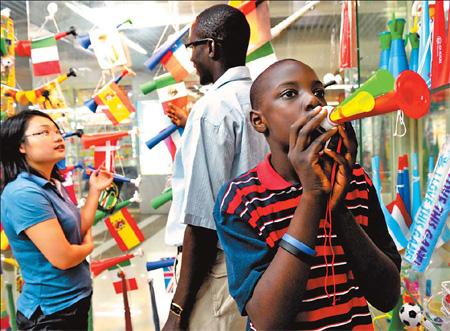
A boy tries a vuvuzela at a trade center in Yiwu, Zhejiang province. Toy factories there have enjoyed boom times thanks to the FIFA World Cup in South Africa. [China Daily]
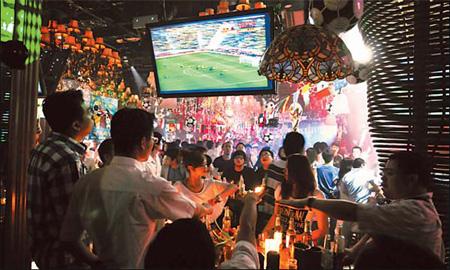
Soccer fans watch a World Cup game at a bar in Fuzhou, capital of Fujian province. [China Daily]
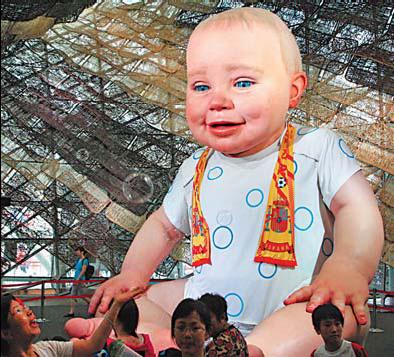
Fans put a scarf on a robot baby at the Spanish pavilion. [China News Service]





